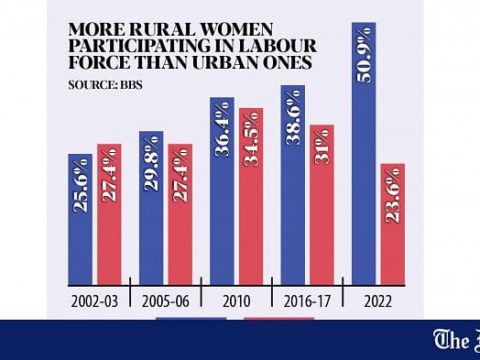
Bangladesh Business and Disability Network (BBDN) with the support of Bangladesh Employers Federation (BEF) and Deutsche Gesellschaft für Internationale Zusammenarbeit (GIZ) GmbH has completed the drafting of a “Return to Work and Rehabilitation Strategy” for people who suffered injuries or disability due to industrial accidents or occupational hazards. Following an initial consultation workshop in January 2020 and further inputs from stakeholders on an initial draft, a final validation workshop was conducted in January 2021 to generate further discussion on finalizing the strategy and taking the implementation forward.
At this high-level strategic workshop, Abdus Salam, secretary, Ministry of Labor and Employment was present as the chief guest. The event included representatives from government, employers’ associations, workers’ associations, GIZ, International Labor Organization (ILO), disability and rehabilitation focused organizations, according to a press release from BBDN.
Murteza Rafi Khan, CEO of BBDN, contextualized the need for continued improvement of labor standards in alignment with the economic graduation of Bangladesh towards a middle-income country and the relevant implications from a social, human rights and economic perspective, particularly in light of maintaining the duty-free GSP status that Bangladesh currently holds with the EU.
Moazzem Hussain, Senior Technical Advisor, GIZ discussed the return-to-work program’s activities and the policies that have already been implemented in many RMG, leather and textiles factories. He underscored the current practices and the state of laws and regulations in relation to worker rehabilitation and return to work.
Shaquib Quoreshi, Consultant, BBDN, delivered the keynote presentation on the return to work and rehabilitation strategy and emphasized the six thematic areas identified for strategic intervention in the document and highlighted the fact that all sectors including healthcare, labour, occupational safety, vocational training and policymakers should come together for the strategy to be a success. A particular emphasis was placed on the importance of making necessary amendments to the Bangladesh Labor Act.
An open floor discussion followed the keynote, during which Rafiqul Islam from BGMEA, highlighted a crucial point from the labor law stating that the rehabilitation focused laws acknowledge people who become injured or disabled in the workplace, but it doesn’t acknowledge people who have a pre-existing or congenital disability. He suggested that the proposed amendments also seek a separate section for workers with pre-existing disabilities.
Wazedul Islam, General Secretary, Bangladesh Trade Union Centre, highlighted that in addition to the RMG and leather sector, other sectors also require engagement with this program to improve their capacity and standards. He cited the Shipbreaking Industry as an example, and said that the workers of this industry also need access to better working environment and rehabilitation facilities as they face occupational hazards.
Iftekhar Ahmed, from CSID, said that many injury survivors suffer from residual disability even during and after the rehabilitation process which are related to mental trauma and inhibit them from returning to the workplace.
After the open discussion, the panelists gave their insights on the strategy and action plan.
Nazmul Ahsan Jewel, Member Secretary of National Coordination Committee for Workers’ Education, recommended creating tripartite collaboration including employers, the workers, and government for further advancement of the policies and action plan.
Habibullah N. Karim, Vice President, Bangladesh Employers’ Federation, advised that employer’s point of view should be considered for implementation of the strategy.
Noushin Shah, National Program Coordinator, ILO, emphasized the importance of policy changes in labor laws to enforce and maintain long-term provisions of the rehabilitation support for the workers.
Farid Ahmed, Joint Inspector General, Safety Department of Inspection for Factories and Establishment (DIFE), stated that DIFE is mandated to work on preventive issues and ensure compensation of workers with limited scope on rehabilitation specifically.
Abdul Latif Khan, Additional Director General, Department of Labour (DOL), highlighted that there is an existing knowledge gap of workers on their rights related to employment injury and rehabilitation, which needs to be addressed. He further advised that the existing facilities of DOL and DIFE may be taken into consideration such as the 32 labour welfare centres that are used as primary medical facilities of workers, which could be more effectively utilized through necessary upgrades and updates. The welfare centers can also play a role on psychological counselling and addressing mental health needs. He further opined that the compensation amount may be increased if it’s not sufficient for workers who become disabled.
In outlining the way forward, Dr Silvia Popp, Project Manager EIPS, GIZ, thanked the attendees for their valuable inputs on the strategy. Dr Popp requested the attention of Ministry of Labor and Employment to steer the process for taking the rehabilitation and return to work strategy forward into implementation, as per the ministerial allocation of business. She emphasised that during the last amendment of the Labor Act the issue of return to work and rehabilitation remained unaddressed, therefore the strategy rightly captures the changes required in the legal landscape, the need for further intra-ministerial coordination, capacity building and infrastructure development.
Abdus Salam, Secretary, Ministry of Labor and Employment in his speech as the Chief Guest shared that the process for the amendment of the labor law will start shortly, which is an opportune moment to propose the relevant legal amendments, though the mechanism for changes to the law is complex. He highlighted the uniqueness of the ministry as there is a tripartite consultative council with the representation of employers, workers and the government to consider and take forward relevant issues. He mentioned that the Labor Act 2006 has some provisions on disability related issues. However, there is a lack of an action plan to operationalize it, he added.













